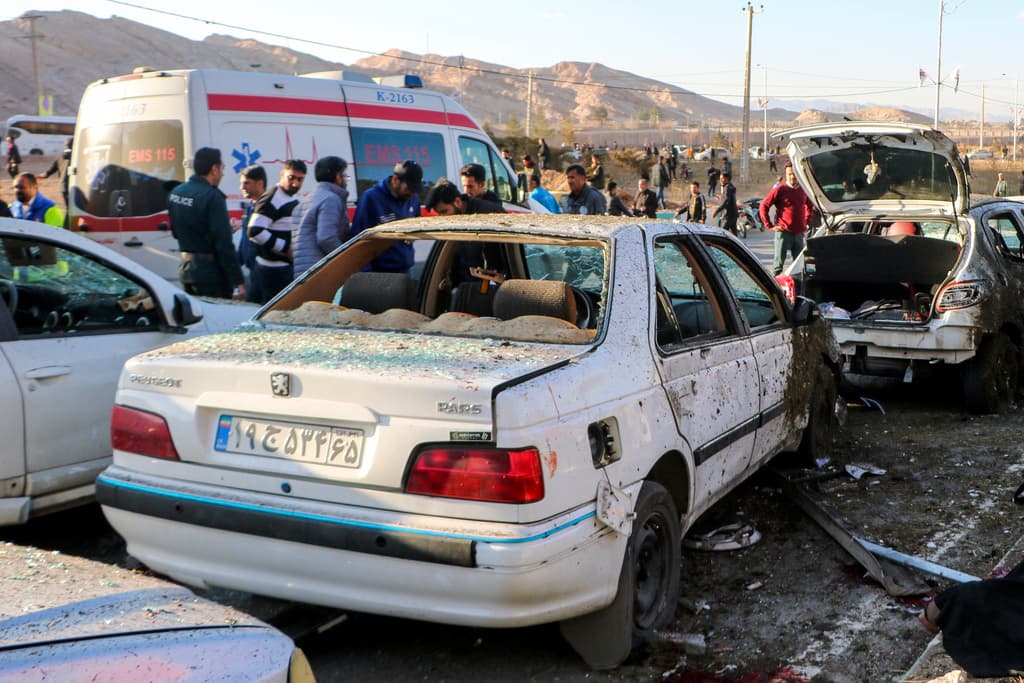Tehran’s Opponents See Possible False-Flag Operation in Deadly Attack Near Soleimani’s Gravesite
‘We, the people of Iran, know very well that the Islamic Republic has experienced many violent episodes by internal groups in order to put the blame on Israel or America,’ an Iranian-American journalist and activist, Masih Alinejad, writes.

A “terror” attack that killed more than 100 people at an event commemorating the fourth anniversary of the death of an Iranian arch-terrorist, Qassem Soleimani, is widely expected to be followed by retaliation from Tehran — so much so that regime opponents believe it might have been self-inflicted, to create the pretext for a counterattack.
Two explosive devices planted along the road leading to Soleimani’s burial site in Martyrs’ Cemetery at Kerman, Iran, were detonated remotely by “terrorists,” the regime-run IRNA news agency reported. Like other official press outlets, it did not specify a perpetrator in the deadly attack or name any well-known victim.
“How is it that only civilians were killed and not even a parliamentarian or mayor?” an Iran scholar at Tel Aviv’s Institute for National Security Studies, Beni Sabti, asks the Sun. Soleimani’s closest relatives and associates, including his daughter Zeinab, were nowhere near the prominent event, raising suspicion they may have been warned of a pending attack.
Mr. Sabti also notes that the first world leaders to console Tehran, Presidents Erdogan of Turkey and Putin of Russia, are seen by Iranians as the types who would themselves mastermind false-flag operations. Regime critics suspect that by bombing such a symbolic event, Iran is “seeking legitimacy to attack opponents,” Mr. Sabti says.
“We, the people of Iran, know very well that the Islamic Republic has experienced many violent episodes by internal groups in order to put the blame on Israel or America,” an Iranian-American journalist and activist, Masih Alinejad, writes on X. “We have seen this play out before. The regime uses civilians as human shields to mobilize public opinion against Israel.”
Ms. Alinejad points to the 2020 downing of a Ukrainian civilian airplane, at which Tehran admitted to “accidentally” shooting. In fact, she writes, the Islamic Revolutionary Guards Corps shot it down in order to blame America. Likewise, she adds, “many Iranians believe that today’s show was orchestrated by the regime to play victim as they have failed to retaliate against the blows from Israel.”
In recent weeks and months, Israel has reportedly hit IRGC targets in Syria, Lebanon, and even inside Iran. Last week’s killing of a top Guards operative, Seyyed Razi Mousavi, who coordinated Iran’s proxies in Lebanon and Syria, was specifically painful.
Israel will “certainly pay for this crime,” President Raisi said in a statement.
Tuesday’s killing in Lebanon of the top Hamas leader, Saleh al-Arouri, was another major blow to Iran’s prestige. Al-Arouri was widely considered Hamas’s closest IRGC confidant and top promoter of ties between the Sunni terrorist group and the Shiite Islamic Republic. Israelis often point to similarities between al-Arouri and Soleimani.
Before he was killed in 2020, Soleimani, the IRGC’s Quds Force commander, was the mastermind of Iran’s proxy architecture that is now at the heart of the Mideast wars. Soleimani personally cultivated, armed, trained, recruited, and coordinated among Syrian and Iraqi militias, Palestinian groups, Hezbollah, the Houthis, and other pro-Iran forces. In the process, he achieved a mythical status among pro-regime Iranians.
The Wednesday attack at his gravesite adds to the “likelihood of an overt and direct response by the regime,” an Iran watcher at the Foundation for Defense of Democracies, Behnam Ben Taleblu, tells the Sun. “Don’t be surprised if Tehran points a finger abroad and blames Israel, which is a tried and true tactic, despite this attack closely having hallmarks of jihadist or separatist groups.”
Iran is “seeking legitimacy to retaliate, following a host of hits it has suffered,” Mr. Sabti of Israel’s INSS says. “They are being hit a lot by Israel and the U.S., so they seek revenge. Even if they attack Baluchis or Kurds, they could say that such minorities, or even ISIS, work for Israel. I wouldn’t be surprised if they hang a few people in the next few days.”
In the 1990s Iran used Hezbollah operatives to bomb the Israeli embassy in Argentina and the Jewish center, AMIA, at Buenos Aires. In 2013, Hezbollah similarly assaulted an Israeli tourist bus in Bulgaria. Last month the Mossad helped Cypriot authorities foil an Iranian attempt to kill Israelis on the island.
Iran has also plotted to kill Ms. Alinejad on American soil, as well as officials in President Trump’s administration who, Tehran says, were involved in Soleimani’s killing. As of late, though, the Islamic Republic’s attempts at retaliation have been tepid.
Wednesday’s attack at Soleimani’s gravesite may well have been orchestrated by anti-regime operators, as Tehran says, or it could have been a false-flag operation. Either way, the Islamic Republic’s “harsh revenge” could well become a “driver of escalation” in the region, Mr. Ben Taleblu says.

